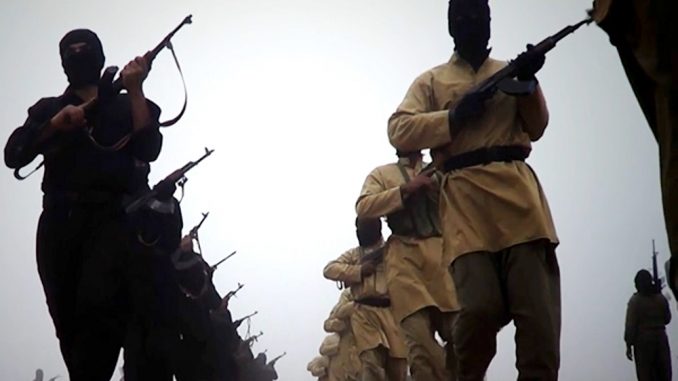
President Donald Trump is about to send 50,000 ground troops into Syria in a move that will see the U.S. army unwittingly fight alongside ISIS and al-Qaeda.
If National Security Adviser, Gen. H.R. McMaster, gets his way, tens of thousands of troops would put the U.S. in direct confrontation with Russia and Syria.

BYPASS THE CENSORS
Sign up to get unfiltered news delivered straight to your inbox.
You can unsubscribe any time. By subscribing you agree to our Terms of Use
Latest Video
Thefreethoughtproject.com reports:
Antiwar.com’s Jason Ditz explains,
“When President Trump took office, Syria had only about 300-400 US troops present, and while that number has grown significantly (exact figures are no longer provided by the Pentagon), a 50,000 troop deployment would be both shocking and have a huge impact on the region, likely sparking a major backlash from Syria, who has not invited US troops to operate in their territory in the first place.”
A troop deployment of that magnitude could also risk putting Washington in direct conflict with Moscow — feasibly acting as the catalyst for world war. Not to mention, it would be a substantial departure from Trump’s statement to Fox Business News,
“We’re not going into Syria.”
And as Bloomberg reports, McMaster’s strategy hasn’t necessarily been well-received by others in the Trump administration:
“McMaster himself has found resistance to a more robust ground troop presence in Syria. In two meetings since the end of February of Trump’s national security cabinet, known as the principals’ committee, Trump’s top advisers have failed to reach consensus on the Islamic State strategy. The White House and administration officials say Secretary of Defense James Mattis, Chairman of the Joint Chiefs of Staff Joseph Dunford and General Joseph Votel, who is in charge of U.S. Central Command, oppose sending more conventional forces into Syria. Meanwhile, White House senior strategist Stephen Bannon has derided McMaster to his colleagues as trying to start a new Iraq War, according to these sources.”
Trump’s first national security adviser, Ret. Lt. General Michael Flynn, had — as many others — sought to avoid increased troop presence in Syria’s complex war, as it would pit U.S. personnel against militants of the Islamic State and iterations of al-Qaeda, as well as the Russian and Syrian militaries.
McMaster’s opponents feel an amplified version of former President Obama’s plans to fight ISIL — airstrikes in conjunction with special forces operations, including the training of local fighters — presents the most efficacious strategy to deal with Syria’s murky morass of hostile entities.
Bloomberg notes top Pentagon brass seek to loosen rules of engagement for special forces, including providing them additional air support, such as attack helicopters, for future operations against the self-proclaimed caliphate.
But that would require reliance on groups with personal agendas in Syria — like Kurdish militias.
Retired four-star U.S. Army General Jack Keane — who is close to McMaster but did not speak for the general — told Bloomberg’s senior national security correspondent, Eli Lake, that while the Kurds have indeed actively fought ISIL, Arab forces have been primarily focused on fighting the Assad regime.
“Our special operations guys believe rightfully so that this was a proven force that could fight,” Keane told Lake of the Kurdish fighters. “While this makes sense tactically, it doesn’t make sense strategically. Those are Arab lands, and the Arabs are not going to put up with Syrian Kurds retaking Arab lands. Whenever you select a military option, you have got to determine what political end state will this support. Regrettably this option puts us back to the drawing board.”
Turkish President Recep Tayyip Erdoğan has expressed marked ambivalence over the U.S. arming and training to Syrian Kurds — whom he believes allied with Turkey’s Kurdish separatist rebels — as those assets could hastily be turned against the Turkish government. And that perception is high-risk for the U.S. military, which requires access to Turkey’s Incirlik air base to fly sorties against the Islamic State in Syria and elsewhere in the region.
Keane feels the U.S. would be better served accepting the assistance of Sunni Arab coalition forces in fighting the Islamic State. But that could further exacerbate tensions with Shi’a fighters, as well as with the Assad regime.
Although two unnamed and unverifiable sources told Lake the 50,000 troops figure is being debated behind closed doors, an explosive report circulated widely online, which cited that figure as 150,000 troops, is wildly exaggerated and not at all legitimate.
Every possible solution to the issue of Syria — where the U.S. seeks to depose Assad, while combating the insidious Islamic State — is now being deliberated.
With Trump’s schizophrenic amplifications of tension peppered with an almost dismissive tone on the threat presented by Assad remaining in power, whether or not McMaster’s desired 50,000 U.S. military personnel will actually be deployed to war-ravaged Syria remains an open — and crucial — question.


